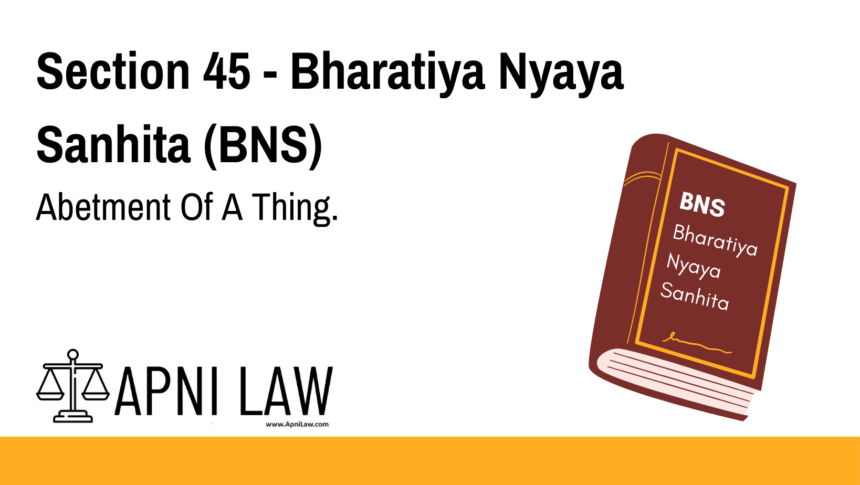Code: Section 45 BNS
A person abets the doing of a thing, who—
(a) instigates any person to do that thing; or
(b) engages with one or more other person or persons in any conspiracy for the
doing of that thing, if an act or illegal omission takes place in pursuance of that
conspiracy, and in order to the doing of that thing; or
(c) intentionally aids, by any act or illegal omission, the doing of that thing.
Explanation 1.—A person who, by wilful misrepresentation, or by wilful concealment
of a material fact which he is bound to disclose, voluntarily causes or procures, or attempts
to cause or procure, a thing to be done, is said to instigate the doing of that thing.
Illustration.
A, a public officer, is authorised by a warrant from a Court to apprehend Z. B, knowing
that fact and also that C is not Z, wilfully represents to A that C is Z, and thereby intentionally
causes A to apprehend C. Here B abets by instigation the apprehension of C.
Explanation 2.—Whoever, either prior to or at the time of the commission of an act,
does anything in order to facilitate the commission of that act, and thereby facilitates the
commission thereof, is said to aid the doing of that act.
Explanation of Section 45 BNS
Section 45 of the Bharatiya Nyaya Sanhita (BNS) defines the concept of abetment in criminal law. A person is said to abet an offense if they:
- Instigate someone to commit a crime.
- Conspire with others to commit a crime, provided some act occurs to further the conspiracy.
- Assist or facilitate the crime by any act or illegal omission.
Abetment holds equal criminal liability as direct commission, ensuring that those who provoke or aid criminal acts face consequences under the law.
Key Aspects of Abetment
- Instigation: Includes provocation, encouragement, persuasion, or threats that lead someone to commit a crime.
- Conspiracy: Mere planning is not enough—there must be an act in furtherance of the crime.
- Aiding and Illegal Omission: Helping directly or through inaction when there’s a legal duty to act.
Illustration
Example 1: Instigation
A tells B to commit theft and persuades him by offering money. If B steals, A has abetted the theft.
Example 2: Criminal Conspiracy
X, Y, and Z plan a robbery. If one of them buys a weapon or rents a getaway car, the others are equally guilty under abetment by conspiracy.
Example 3: Aiding a Crime
A police officer is aware of an impending murder but deliberately avoids taking action. This illegal omission amounts to abetment.
Common Questions and Answers on Section 45 BNS
1. Can a person be punished for abetment if the crime was not committed?
Yes. Abetment is a crime in itself, even if the intended crime is not executed.
2. What is the punishment for abetment under BNS?
The punishment depends on the offense abetted. Generally, an abettor receives the same punishment as the principal offender.
3. Is mere presence at the crime scene considered abetment?
Not necessarily. Passive presence is not enough—there must be instigation, conspiracy, or active aid.
4. What is the difference between abetment and conspiracy?
- Conspiracy requires an agreement plus an overt act.
- Abetment can occur through instigation or aiding without an agreement.
5. How is abetment proved in court?
Courts consider witness statements, evidence of communication, and actions leading up to the crime to establish abetment.
Conclusion
Section 45 BNS ensures that those who instigate, conspire, or assist in a crime face legal consequences. This provision plays a crucial role in deterring criminal intent and punishing indirect involvement in offenses.
For expert legal insights, visit ApniLaw today! 🚀








